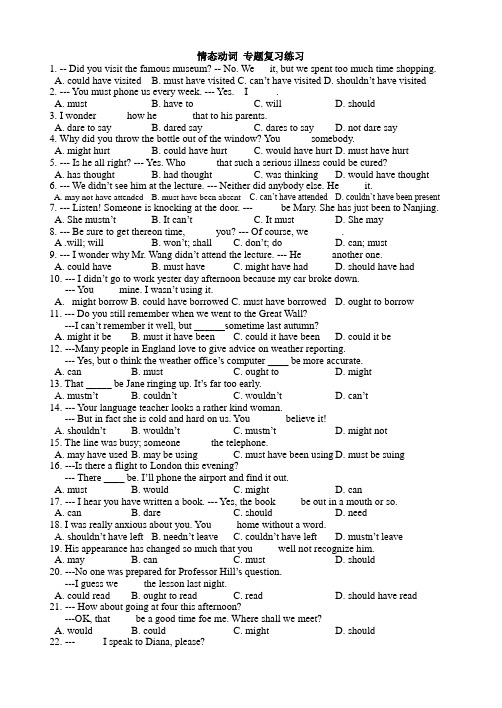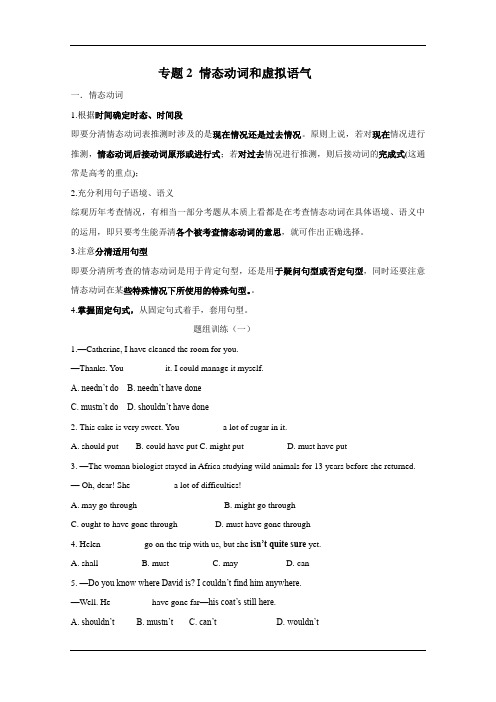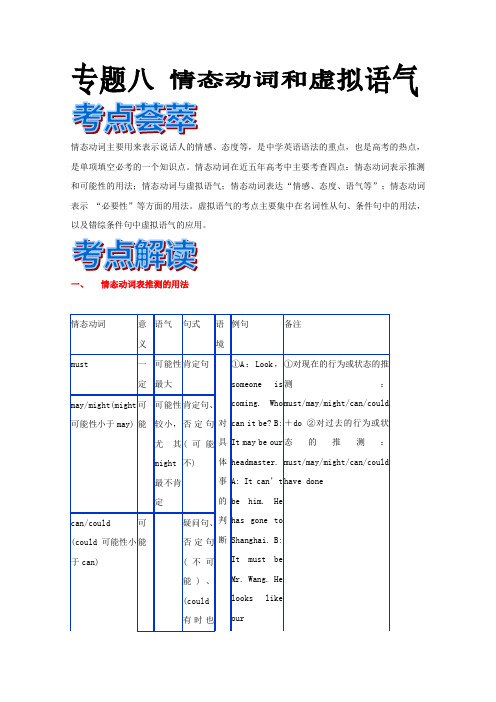情态动词复习(2)
- 格式:ppt
- 大小:473.00 KB
- 文档页数:14


情态动词复习要点一、can/could和may/might表示“许可”1. 两者都可以表示许可,常可互换。
如:Can(May)I borrow your knife?我可以借你的刀子吗?The teacher says we can(may)leave early tomorrow. 老师说我们明天可以早一点走。
2.表示请求许可时,用could/might 比用can/ might更委婉。
但肯定回答时要用can或may。
---Could(Might)I stay in your office? 我可以呆在你的办公室吗?--- Of course, you can(may). 当然可以。
3. 表示“禁止,不允许”时用must not(mustn’t)。
You mustn’t climb the tree. It’s dangerous. 你不能爬树,那危险。
二、can, could和be able to表示“能力”1. 在现在时中can, be able to可互换。
如:I can(am able to) write some English words now. 我现在会写一些英语单词了。
2. be able to还可用于将来时和完成时。
如:He will be able to see you tomorrow.他明天去拜访你。
I have been able to go to work for a week. 我已经上班一周了。
3. 在过去时中,could表示泛指的能力,was/were able to表示过去特定的某一次能力。
如:She could swim when she was ten. 她十岁时就会游泳了。
Only thirty people in the building were able to escape after the fire broke out. 大火爆发后只有三十人从大楼里逃了出来。

情态动词的用法整理归纳为了做好高中英语的备考复习,下面由小编为你精心准备了“情态动词的用法整理归纳",持续关注本站将可以持续获取更多的考试资讯!情态动词的用法整理归纳情态动词有can (could), may (might), must, have to,shall (should,will (would),dare (dared),need (needed), ought to等。
情态动词无人称和数的变化;不能单独使用,必须与其后的动词原形构成谓语。
一、 can, could1)表示能力(体力、知识、技能)。
Can you lift this heavy box?(体力)Mary can speak three languages.(知识)Can you skate?(技能)此时可用be able to代替。
Can只有一般现在时和一般过去式;而be able to则有更多的时态。
I’ll not be able to come this afternoon.当表示“经过努力才得以做成功某事”时应用be able to,不能用Can。
如:He was able to go to the party yesterday evening in spite of the heavy rain.2)表示请求和允许。
-----Can I go now?----- Yes, you can. / No,you can’t.此时可与may互换。
在疑问句中还可用could,might代替,不是过去式,只是语气更委婉,不能用于肯定句和答语中。
---- Could I come to see you tomorrow?---- Yes, you can. ( No,I’m afraid not. )3)表示客观可能性(客观原因形成的能力)。
They’ve changed the timetable,so we can go by bus instead.This hall can hold 500 people at least.4)表示推测(惊讶、怀疑、不相信的态度),用于疑问句、否定句和感叹句中。

情态动词专题复习练习1. -- Did you visit the famous museum? -- No. We __ it, but we spent too much time shopping.A. could have visitedB. must have visitedC. can’t have visitedD. shouldn’t have visited2. --- Y ou must phone us every week. --- Y es. I _____.A. mustB. have toC. willD. should3. I wonder _____ how he ______ that to his parents.A. dare to sayB. dared sayC. dares to sayD. not dare say4. Why did you throw the bottle out of the window? Y ou _____ somebody.A. might hurtB. could have hurtC. would have hurtD. must have hurt5. --- Is he all right? --- Y es. Who _____ that such a serious illness could be cured?A. has thoughtB. had thoughtC. was thinkingD. would have thought6. --- We didn’t see him at the lecture. --- Neither did anybody else. He ____ it.A. may not have attendedB. must have been absentC. can’t have attendedD. couldn’t have been present7. --- Listen! Someone is knocking at the door. ---_____ be Mary. She has just been to Nanjing.A. She mustn’tB. It can’tC. It mustD. She may8. --- Be sure to get thereon time, _____ you? --- Of course, we ______.A .will; will B. won’t; shall C. don’t; do D. can; must9. --- I wonder why Mr. Wang didn’t attend the lecture. --- He _____ another one.A. could haveB. must haveC. might have hadD. should have had10. --- I didn’t go to work yester day afternoon because my car broke down.--- Y ou ____ mine. I wasn’t using it.A.might borrowB. could have borrowedC. must have borrowedD. ought to borrow11. --- Do you still remember when we went to the Great Wall?---I can’t remember it well, but ______sometime last autumn?A. might it beB. must it have beenC. could it have beenD. could it be12. ---Many people in England love to give advice on weather reporting.--- Y es, but o think the weather office’s computer ____ be more accurate.A. canB. mustC. ought toD. might13. That _____ be Jane ringing up. It’s far too early.A. mustn’tB. couldn’tC. wouldn’tD. can’t14. --- Y our language teacher looks a rather kind woman.--- But in fact she is cold and hard on us. Y ou ______ believe it!A. shouldn’tB. wouldn’tC. mustn’tD. might not15. The line was busy; someone _____ the telephone.A. may have usedB. may be usingC. must have been usingD. must be suing16. ---Is there a flight to London this evening?--- There ____ be. I’ll phone the airport and find it out.A. mustB. wouldC. mightD. can17. --- I hear you have written a book. --- Y es, the book ____ be out in a mouth or so.A. canB. dareC. shouldD. need18. I was really anxious about you. Y ou ____ home without a word.A. shouldn’t have leftB. needn’t leaveC. couldn’t have leftD. mustn’t leave19. His appearance has changed so much that you ____ well not recognize him.A. mayB. canC. mustD. should20. ---No one was prepared for Professor Hill’s question.---I guess we ____ the lesson last night.A. could readB. ought to readC. readD. should have read21. --- How about going at four this afternoon?---OK, that ____ be a good time foe me. Where shall we meet?A. wouldB. couldC. mightD. should22. ---_____ I speak to Diana, please?--- I’m sorry she _____ come to the phone because she’s washing her hair.A. Might; won’tB. Can; mustn’tC. May; can’tD. Could; wouldn’t23. --- I wonder if I ____ smoke there.--- No, you ____. Could you see the sign “NO SMOKING” there?A. can; needn’tB. shall; won’tC. must; can’tD. may; mustn’t24. ---Why didn’t you tell me there was no meeting today?--- I ____ all the way here through the heavy snow.A. needn’t have drivenB. can’t have drivenC. mustn’t have drivenD. shouldn’t have driven25. --- Shall I go and buy two more bottles of beer?--- N o. I’ve already bought twenty. That ____ be enough for us two.A. canB. mayC. ought toD. might26. The boss ____the worker how to do it, or the accident couldn’t have happened.A. can’t have toldB. ought to tellC. mustn’t have toldD. mustn’t have told27. She ____ the hospital so soon, for she has not yet recovered.A. wouldn’t have leftB. shouldn’t have leftC. mustn’t have leftD. hadn’t left28. He doesn’t have much money so he _____ stay in a four-star hotel.A. mustn’tB. can’tC. shouldn’tD. needn’t29. I ______ work full time. I only work in the afternoons. I have lectures in the morning.A. won’tB. can’tC. shouldn’tD. may not30. --- Y ou are making me very nervous. Don’t you think you ____ slow sown a bit?---Oh, I’m sorry. I didn’t realize I was going so fast.A. shallB. mayC. couldD. might31. We _____ booked. Look, the restaurant is almost empty.A. must haveB. can’t haveC. should haveD. needn’t have32. --- What happened to the roses I gave you? --- The roses ___ well, but I didn’t water them.A. would haveB. might growC. would have grownD. needn’t have grown33. My parents never remember my telephone number, they always _____ look it up.A. mustB. canC. needD. have to34. --- ____ you pass me a pen? I’d like to write down the phone number. – Sure. Here it is.A. NeedB. MustC. CouldD. Might35. There was a lot of fun at yesterday’s party. Y ou ___ come, but why didn’t you?A. must haveB. shouldC. need haveD. ought to have36. The thief _____ in from the kitchen window as all the other windows and door were closed.A. may climbB. must have climbedC. could have climbedD. should have climbed37. --- Shall I tell Ann the test results? --- No, you ____. She’s already got the score report.A. wouldn’tB. needn’tC. mustn’tD. shouldn’t38. Y ou _____ be careful when you cross here --- the traffic lights aren’t working.A. couldB. mightC. ought toD. may39. The driver has drunk too much wine and dangerous things ___ happen to him at any time.A. shouldB. canC. mustD. need40. ---I came here by taxi and the driver charged me 40 yuan. ---Really? Y ou ____ by bus.A. could have comeB. can have comeC. must have comeD. may have come41. ---Would you come back late next time? --- No, I _____.A. shan’tB. won’tC. wouldn’tD. mustn’t42. I’m listening hard but I _____ hear what he is saying.A. may notB. can’tC. won’tD. shouldn’t43. But she ____ never do it, you know, it was useless even to demand it of her.A. couldB. wouldC. shouldD. might44. We have been away for twenty years. Y ou _____ imagine how delightful we were when meeting again.A. mustB. canC. willD. might45. --- Why do you ask me to do the difficult work? --- Because you _____ do such a thing and nobody is fit for it.A. wouldB. can C should D. may情态动词答案:1-10ACBBD CCACB11-20CCDBC CCAAD21-30ACDAC ABBBC 31-45 DCDCD BBCAA BBBBB。

专题2 情态动词和虚拟语气一.情态动词1.根据时间确定时态、时间段即要分清情态动词表推测时涉及的是现在情况还是过去情况。
原则上说,若对现在情况进行推测,情态动词后接动词原形或进行式;若对过去情况进行推测,则后接动词的完成式(这通常是高考的重点);2.充分利用句子语境、语义综观历年考查情况,有相当一部分考题从本质上看都是在考查情态动词在具体语境、语义中的运用,即只要考生能弄清各个被考查情态动词的意思,就可作出正确选择。
3.注意分清适用句型即要分清所考查的情态动词是用于肯定句型,还是用于疑问句型或否定句型,同时还要注意情态动词在某些特殊情况下所使用的特殊句型。
4.掌握固定句式,从固定句式着手,套用句型。
题组训练(一)1.—Catherine, I have cleaned the room for you.—Thanks. You _________it. I could manage it myself.A. needn’t doB. needn’t have doneC. mustn’t doD. shouldn’t have done2. This cake is very sweet. You _________ a lot of sugar in it.A. should putB. could have putC. might putD. must have put3. —The woman biologist stayed in Africa studying wild animals for 13 years before she returned. — Oh, dear! She _________ a lot of difficulties!A. may go throughB. might go throughC. ought to have gone throughD. must have gone through4. Helen _________ go on the trip with us, but she isn’t quite sure yet.A. shallB. mustC. mayD. can5. —Do you know where David is? I couldn’t find him anywhere.—Well. He _________have gone far—his coat’s still here.A. shouldn’tB. mustn’tC. can’tD. wouldn’t6. He paid for a seat, when he _________ have entered free.A. couldB. wouldC. mustD. need7. —Lucy doesn’t mind lending you her dictionary.—She _________. I’ve already borrowed one.A. can’tB. mustn’tC. needn’tD. shouldn’t8. Zhang Lin was addicted to computer games during his last year in high school , otherwise he____________a student of Beijing University .A.would have been B.should be C.has been D.had been9. ---Your sister nearly _______ all her spare time to her study during the three years.----That's right,or she ________ the first place in her school in the College Entrance Examination.A. devoted; wouldn't have takenB. spent; wouldn't have takenC. had devoted; hadn't takenD. had spent; couldn't take10.—Any information about your son?—No. If only I ______ those tough words to him.A.didn't say B.hadn't saidC.shouldn't have said D.couldn't have said11. It is important that we _____ act out at once to protect the environment.A. wouldB. shouldC. willD. can12. John’s pale face suggested that he ______ill, and his parents suggested that he ______a medical examination.A. be, should haveB. was, haveC. should be, hadD. was, has13. But for the leadership of our Party and our Government, we __________ these splendid results. A.have achieved B.shouldn’t have achievedC.should have achieved D.would achieve14.He hesitated for a moment before kicking the ball, otherwise he ____ a goal.A. had scoredB. scoredC. would scoreD. would have scored【学法导航】考生在复习虚拟语气时要注意如下几点:1.把握虚拟语气的常用句式;2.正确辨析混合时间的虚拟语气,如果条件句中的动作和主句的动作不是同时发生,主句和从句的谓语动词的形式应分别根据各自所表示的时间加以调整。

情态动词主要用来表示说话人的情感、态度等,是中学英语语法的重点,也是高考的热点,是单项填空必考的一个知识点。
情态动词在近五年高考中主要考查四点:情态动词表示推测和可能性的用法;情态动词与虚拟语气;情态动词表达“情感、态度、语气等”;情态动词表示“必要性”等方面的用法。
虚拟语气的考点主要集中在名词性从句、条件句中的用法,以及错综条件句中虚拟语气的应用。
一、情态动词表推测的用法headmaster.②That maynot be true.③Hecouldn'thavediscoveredthe truth.注意:should (ought to)表示推测是高考考查的重点和难点。
如:—When can I come for the photos?I need them tomorrow afternoon.—They ________ be ready by 12:00.A.can B.should C.might D.need【解析】 B A项表示推测时常用于否定句和疑问句中。
C项表示推测语气不太肯定。
should意为“按理说,理应”,既回答了顾客的询问,不失礼貌,又为照片有可能尚未洗好,顾客到时取不到留下了回旋的余地,体现了店主的精明与用词经过仔细推敲。
二、情态动词的其他用法1.can, could, may, might2.must, should3. need, dare4.shall/will/would4.shall/will/would4.shall/will/would二、情态动词+have done四、虚拟语气虚拟语气表示说话人所说的话不是事实,而是一种假设、愿望、怀疑或推测。
1.虚拟语气在条件句中的用法If it were to rain tomorrow, I should not drive my car. 如果明天下雨的话,我就不开车了。
(明天的情况还不知道)If I had done it in time, I should have had a good time. 如果我及时做的话,日子就好过多了。
2023年高中英语语法:情态动词10条学习要点“could+have+过去分词”用法全面归纳有关情态动词的10条学习要点1. 弄清基本语法特点情态动词就是表示说话的语气或情态的动词。
常见的情态动词有can, may, must, need, dare, shall, will, should, ought to, have to, used to, had better, would rather等。
情态动词具有以下3个特点:(1)情态动词后面接动词原形并与动词原形一起构成谓语。
(2)情态动词虽有时态的变化,但却没有人称和数的变化,即情态动词不会因为主语的人称或单复数的不同而用不同的形式。
(3)变为疑问句或否定句时不需要助动词,而是将情态动词移至主语前变为疑问句,直接在情态动词后加not,构成否定句。
2. 弄清表示能力的can / could和be able to的用法(1)can表示具有某种能力或技能,意为“能,会”。
如:Who can answer this question? 谁能回答这个问题?(2)can 的过去式为could,但它通常只表示过去一般性能力,不表示过去特定场合下的能力,遇此情况要用was [were] able to。
如:I could run faster then. 我那时能跑得更快一些。
They were able to jump into the sea before the boat was blown up. 他们在船爆之前跳入海里。
3. 弄清表示许可的can / could / may / might / must的用法can / could / may / might均可表示许可,只不过may较侧重讲话人的许可,而can较侧重客观情况的许可;could / might的语气比can / may更委婉、客气;在答语中表示允许别人做某事要can / may,不能用could / might。
情态动词英语语法知识点情态动词,本身有一定的词义,表示语气的单词。
但是不能独立作谓语,只能和动词原形一起构成谓语。
这次小编给大家整理了情态动词英语语法知识点,供大家阅读参考。
1 情态动词的语法特征1) 情态动词不能表示正在发生或已经发生的事情,只表示期待或估计某事的发生。
2) 情态动词除 ought 和 have 外,后面只能接不带 to 的不定式。
3) 情态动词没有人称,数的变化,即情态动词第三人称单数不加-s。
4) 情态动词没有非谓语形式,即没有不定式,分词,等形式。
1 情态动词的语法特征1) 情态动词不能表示正在发生或已经发生的事情,只表示期待或估计某事的发生。
2) 情态动词除 ought 和 have 外,后面只能接不带 to 的不定式。
3) 情态动词没有人称,数的变化,即情态动词第三人称单数不加-s。
4) 情态动词没有非谓语形式,即没有不定式,分词,等形式。
2 比较 can 和 be able to1)can could 表示能力;可能 (过去时用 could),只用于现在式和过去式(could)。
be able to 可以用于各种时态。
They will be able to tell you the news soon. 他很快就能告诉你消息了。
2)只用 be able toa. 位于助动词后。
b. 情态动词后。
c. 表示过去某时刻动作时。
d. 用于句首表示条件。
e. 表示成功地做了某事时,只能用 was/were able to,不能用 could。
He was able to flee Europe before the war broke out. = He managed to flee Europe before the war broke out.注意:could 不表示时态1)提出委婉的请求, (注意在回答中不可用 could)。
--- Could I have the television on?--- Yes, you can. / No, you can't.2)在否定,疑问句中表示推测或怀疑。
情态动词用法归纳总结情态动词是一类用来表示说话人的态度、观点和意愿的动词,具有一定的语法特点。
以下是情态动词的一些常见用法归纳总结:1.表示能力、可能性和推测:- Can: 表示能力和可能性,用于肯定句;例如:“I can swim.”(我会游泳。
)- Could: 表示能力和可能性,用于疑问句和否定句;例如:“Could you help me?”(你能帮助我吗?)- May/might: 表示可能性和推测;例如:“He may be busy.”(他可能很忙。
)- Must: 表示强烈的推测或肯定;例如:“He must be tired.”(他一定很累。
)2.表示许可和建议:- Can: 表示允许和禁止,用于肯定句;例如:“You can go now.”(你现在可以走了。
)- Could: 表示请求允许,用于疑问句和否定句;例如:“Could I borrow your pen?”(我可以借用你的笔吗?)- May/might: 表示请求允许;例如:“May I use your phone?”(我可以用一下你的手机吗?)- Should: 表示建议;例如:“You should eat more vegetables.”(你应该多吃蔬菜。
)3.表示义务和推测:- Must: 表示必须和义务;例如:“You must finish your homework.”(你必须完成作业。
)- Have to: 表示必须和义务;例如:“I have to go to work tomorrow.”(我明天必须去上班。
)4.表示可能性和意愿:- Can: 表示可能性和意愿,用于肯定句;例如:“I can help you with that.”(我可以帮你做那个。
)- Could: 表示可能性和意愿,用于疑问句和否定句;例如:“Could you please pass me the salt?”(请你把盐递给我好吗?)- May/might: 表示可能性和意愿;例如:“I may go to the party tonight.”(今晚我可能会去参加派对。